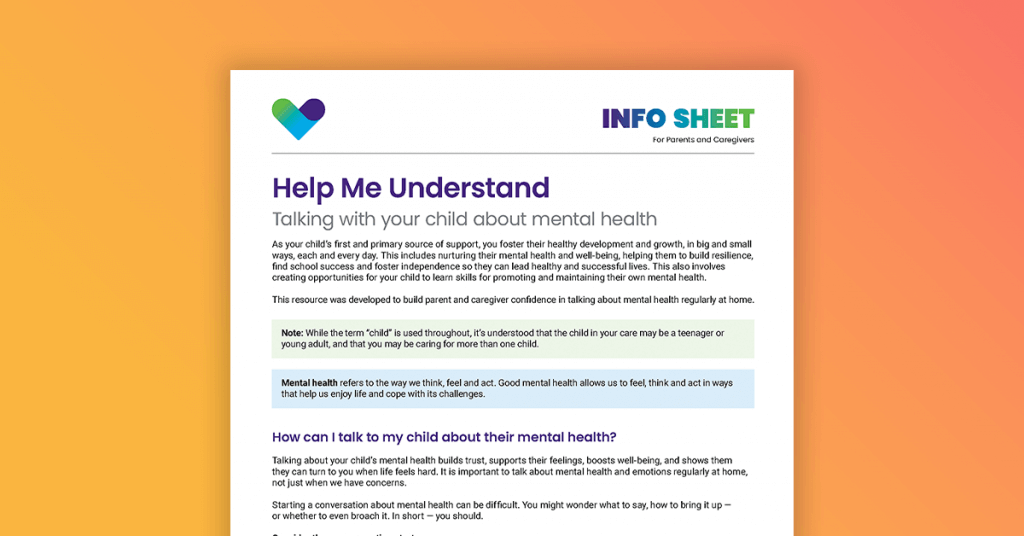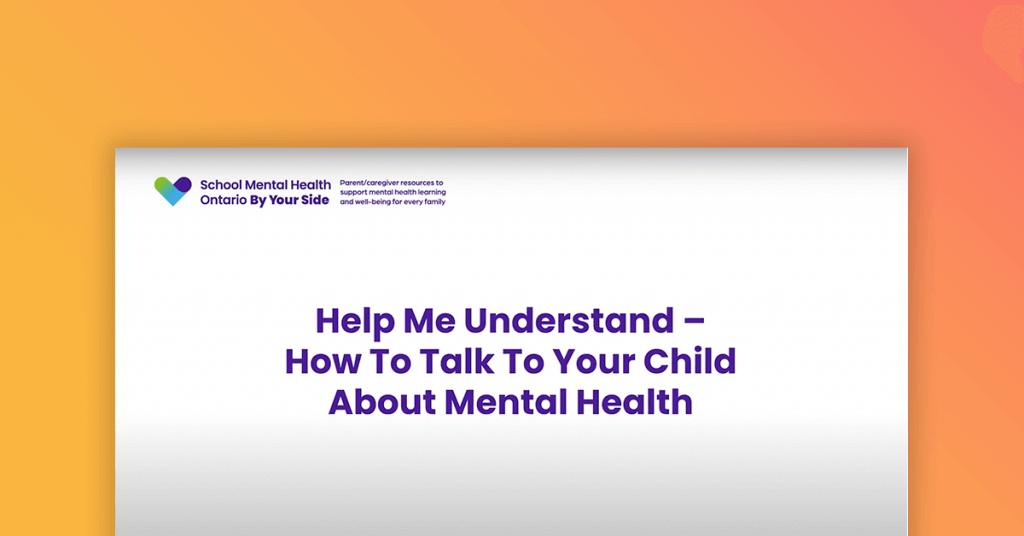Help Me Understand – Talking With Your Child About Mental Health
As your child’s first and primary source of support, you foster their healthy development and growth, in big and small ways, each and every day. This includes nurturing their mental health and well-being, helping them to build resilience, find school success and foster independence so they can lead healthy and successful lives. This also involves creating opportunities for your child to learn skills for promoting and maintaining their own mental health.
How can I talk to my child about their mental health?
Regularly discussing your child’s mental health builds trust, supports their feelings, boosts well-being, and shows them they can turn to you when life feels hard.
Starting a mental health conversation can be difficult.
Consider these conversation starters:
- How are you?/ How are you feeling?
- What was the best part of your day today? How did it make you feel?
- What was the worst part of your day?
- What did you do today that made you proud?
- What would you like to talk about?
If your child is having a hard time, try asking gentle questions:
- Do you want to talk about what’s going on?
- Is there anything you need from me: space, time to talk or do something fun?
- If your child isn’t ready to talk, reassure them by saying: You can talk to me any time; I am always here for you.
- If you need to speak to someone else, that’s okay too.
- If you tell me what’s worrying you, I’ll do my best to help.
- Even if I don’t understand, please know that I want to.
- We’ll get through this together.
You can also try other forms of communication, like writing a letter, drawing a picture or texting, to make it easier for your child to confide in you.
How can I encourage my child to open up about their feelings?
Here are some tips for talking to your child and their feelings:
- Be genuine: Children know when an adult is pretending.
- Use simple language: Avoid language you wouldn’t usually use with your child.
- Allow for silence: Letting your child sit with their thoughts helps them find words for what they’re feeling.
- Watch your body language: It sends big signals to ALL children.
- Provide positive feedback: Recognizing your child’s strengths encourages them to talk.
- Focus the conversation on your child, not on yourself: Try not to compare yourself to your child, which can devalue their experience.
- Recognize your child’s feelings: Their situation is their whole world. Acknowledging and respecting their feelings shows them that you care. If a child is feeling harassed, bullied or a victim of racism, gather the context and work swiftly with your child to address it.
- Recognize their actions: Understand that a child’s actions may be a coping mechanism. They might act impulsively (leave the room, walk away, etc.) as they may lack age-appropriate skills.
- Have frequent conversations: Children of different ages experience varying levels of stress. It helps to discuss feelings, thoughts, and actions that are part of your child’s life.
- Lead by example: Actions speak louder than words. Model mental health for your child. If you’re having difficult feelings, name them.
Where can I go for help if I have concerns?
At school: Speak to your child’s classroom teacher or a staff member with whom you feel comfortable. Ontario schools offer assessment, brief prevention, and early intervention services from social work and psychology staff.
In the community – if more support is needed, school staff or your family doctor can connect your child with mental health services. If you do not have a family doctor/nurse practitioner, please visit Ontario Health to get connected.
Note: Please see the PDF version for further descriptions and information
Helpful Resources
Adding Families to the Homework Equation: A Longitudinal Study of Mathematics Achievement – Frances L. Van Voorhis, 2011. Consulté en ligne le 24 octobre 2024, du site https://journals.sagepub.com/doi/abs/10.1177/0013124510380236
Canada, P. H. A. of. (2015, June 26). About mental health [Education and awareness]. https://www.canada.ca/en/public-health/services/about-mental-health.html
McConnell, B. M., & Kubina Jr., R. M. (2014). Connecting With Families to Improve Students’ School Attendance: A Review of the Literature. Preventing School Failure: Alternative Education for Children and Youth, 58(4), 249–256. https://doi.org/10.1080/1045988X.2013.821649
Ruggeri, K., Garcia-Garzon, E., Maguire, Á., Matz, S., & Huppert, F. A. (2020). Well-being is more than happiness and life satisfaction: a multidimensional analysis of 21 countries. Health and Quality of Life Outcomes, 18(1), 192. https://doi.org/10.1186/s12955-020-01423-y


